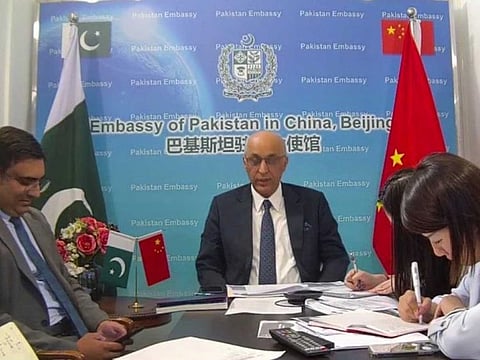Pakistan, China urged to boost tech cooperation
4,500 Chinese technology representatives participate in conference

Islamabad: Tech experts have urged Pakistan and China to strengthen cooperation in science and technology to bolster strategic ties, create jobs and support economic growth.
At the first ‘China-Pakistan Technology Investment Conference’ (CPTIC), the universities in the two countries were urged to broaden tech collaboration focusing on innovation, research and development. Experts also encouraged high-tech firms, research institutes and entrepreneurs in Pakistan and China to boost investment in technology to drive future economic growth.
Biggest Pakistan-China tech forum
More than 4,500 representatives of the Chinese technology ecosystem, including science and technology parks, high-tech production enterprises, investment firms, research and development centers, government officials attended the first-of-its-kind and biggest Pakistan-China tech forum held virtually on July 19. The summit was jointly organised by Special Technology Zones Authority (STZA), Pakistan’s Embassy in China, Cabinet Division of Government of Pakistan, Ministry of Foreign Affairs and Zhongguancun Belt and Road Industrial Promotion Association (ZBRA) of China.
Pakistan’s ambassador to China Moin ul Haque opened the forum where he informed the participants about joint working groups with the Ministry of Science and Technology, and Ministry of Information Technology established under the CPEC framework. He recognised China as a global leader in the technology industry and stated that both countries have many avenues to cooperate in technology and praised the role of STZA in creating effective linkages with Chinese technology companies.
Pakstan and China tech cooperation
China has emerged as a science and technology powerhouse over the years. Chinese technologies in areas such as 5G, AI (artificial intelligence), drones to digital payments, are now global market leaders. STZA aims to create new linkages with the technology sector in China and pave way for the tech partnerships, attract Chinese investments, knowledge and technology capabilities while ensuring ease of doing business in Pakistan’s Special Technology Zones (STZs).
Chairman STZA Amer Hashmi said that “China is a leading partner in developing the knowledge ecosystem in Pakistan.” He shared that STZA had set up a dedicated China desk to help Chinese technology companies and large-scale enterprises investing in Pakistan’s STZs. The STZs are being developed under the Triple Helix Model of Innovation, bringing together the Government, Industry and Academia to remove barriers and create ease of doing business for domestic and foreign technology sector companies, he said. He pledged his resolute support for the Chinese technology investors.
Partnership between universities
Addressing the summit, ZBRA President Zhang Xiaodong called for the “integration of Chinese and Pakistani Universities for joint R&D to enable and support the China–Pakistan Innovation Centre”. He informed the audience that ZBRA and STZA under a partnership are exploring avenues of cooperation for the development of special tech zones in Pakistan. He also said the technology boom helped increase the taxation revenue in China by 2000 times over the last 30 years.
The conference was also facilitated by the Chinese Embassy in Islamabad, represented by the First Secretary of Science and Technology, Cao Zhouhua. He said that Pakistan and China are exploring multi spectral cooperation in the technology sector including, knowledge sharing, zone development, research, policy development, joint training of professionals, and management of special tech zones.
Javaid Iqbal, Chief Commercial Officer of STZA, urged Chinese technology sector companies, investors and large-scale enterprises to engage in strategic conversation with STZA to explore future opportunities, stating that Pakistan’s demographic advantage stood for a unique investment base for Chinese technology companies and research organizations, and both countries could enormously benefit by working together in R&D, especially in emerging technologies such as AI, cloud and quantum computing, semiconductors, internet of things and smart devices design and manufacturing.
Director of Strategic Planning at STZA, Hamza Saeed Orakzai, who also heads the China desk at the organisation, informed the Chinese representatives about the tax incentives, regulatory support and one window facilitation for the perspective Chinese technology investors. He highlighted several large-scale Chinese tech companies that are already in the application process.


